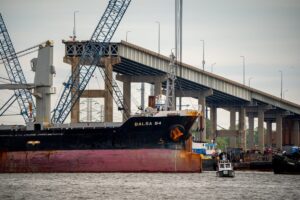Leading ports and shipping companies have launched an initiative to develop zero-emission vessels by 2030.
International shipping accounts for 2.2% of global CO2 emissions. The U.N.’s International Maritime Organization (IMO), has set a goal to cut greenhouse gas emissions by 50% from 2008 levels by 2050.
On January 1, 2020, the IMO’s rules on sulfur emission are due to come into force – a move that will have a monumental impact on the shipping industry.
This legislation will ban any ship from emitting more than 0.5% of sulfur in its fuel, a cut of almost 3% from the current level. Therefore, planning for the implementation will be one of the industry’s biggest challenges in 2019.
In an exclusive insight, PTI has explored the reasons behind the new rules and how some of the world’s biggest carriers are preparing for them.
A coalition of sixty commercial groups including shipping companies such as Maersk, which owns the world’s biggest container shipping line, commodities players such as COFCO International, Cargill, Trafigura, mining group Anglo American as well as banks such as Citigroup, ABN AMRO and Societe Generale have committed to the “Getting to Zero Coalition”.
The coalition is urging for vessels and fuels to be ready by 2030 and supported by the required infrastructure.
Søren Skou, CEO of A.P. Møller Mærsk, said, “Energy efficiency has been an important tool which has helped us reduce CO2 emissions per container with 41% over the last decade and position ourselves as a leader 10% ahead of the industry average.
“However, efficiency measures can only keep shipping emissions stable, not eliminate them.
“To take the next big step change towards decarbonization of shipping, a shift in propulsion technologies or a shift to clean fuels is required which implies close collaboration from all parties.
“The coalition launched today is a crucial vehicle to make this collaboration happen.
Ben van Beurden, CEO of Royal Dutch Shell, said, “Decarbonizing maritime shipping is a huge task with no simple answer, but it has to be done.
“We intend to be part of the long-term, zero-carbon, solution by seeking out the most feasible technologies that can work at a global scale.
“Starting now is essential because ships built today will stay on the water for decades.









